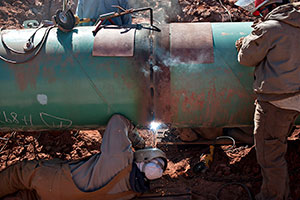TransCanada Keystone Pause Seen Giving Obama, Trudeau New Start

TransCanada Corp.’s request to pause a U.S. review of its Keystone XL oil pipeline gives President Obama a way to ease a political headache at home and help him repair frayed relations with Canada.
The Calgary, Alberta-based company asked Secretary of State John Kerry in a letter Nov. 2 to suspend the assessment of the $8 billion project, arguing it would allow the department to await the results of a separate review in Nebraska. Obama has been critical of Keystone XL, which has been under U.S. review for seven years.
“If you think you’re going to get a ‘no,’ it may be better to wait,” said Kevin Book, managing director at energy policy advisory Clearview Energy Partners in Washington. “The surprise is that it’s the sponsor itself that seems to be pushing for the delay, rather than the administration seeking to avoid a politically difficult decision.”
Keystone XL has been one of the most contentious energy issues of Obama’s presidency, dividing Democratic constituencies ahead of the presidential election, and the request gives him a reason to punt a ruling to the next administration. A suspension of the review would allow Obama to reset the relationship with Justin Trudeau, who will take office as Canada’s prime minister this week.
“It gives the two of them space to discuss other things,” said Julian Zelizer, a professor of history and public affairs at Princeton University. “Any decision in the future, politicians usually prefer.”
While Trudeau favors the pipeline, he has said rebuilding ties with the United States is a top foreign policy priority. Trudeau, who is expected to meet Obama later this month at a Group of 20 summit in Turkey, has emphasized the need for Canada to boost its environmental performance to win favor for pipeline proposals including Keystone. Supporters of the pipeline have argued it would create jobs, while environmentalists and top Democratic donors say it would encourage development of the oil sands, exacerbating climate change.
TransCanada would have a better shot at approval under a Republican president, Book said. Democratic candidate Hillary Clinton has said the pipeline should be rejected.
The U.S. State Department is reviewing the TransCanada letter, spokeswoman Pooja Jhunjhunwala said in an e-mail. White House spokesman Josh Earnest declined to comment, saying the letter was addressed to the State Department. Trudeau spokesman Cameron Ahmad said in an e-mail late Nov. 2 that the Liberal leader didn’t have any comment at that time.
TransCanada decided in September to apply for an additional regulatory review of the line in Nebraska and back off from conflicts with landowners. Suspending the federal process would let the State Department make a decision based on the pipeline’s final route in the state, TransCanada told Kerry on Nov. 2, according to a copy of a letter e-mailed by the company. The company is focused on showing the U.S. benefits of the project, spokesman Mark Cooper said.
“We’ve said from the outset that our focus isn’t on the various political machinations on what the president may or may not do,” Cooper said.
Keystone XL would span 1,179 miles from Alberta through three states — Montana, North Dakota, and Nebraska — before connecting to an existing pipeline network feeding crude to U.S. Gulf Coast refineries. The line would carry as much as 830,000 barrels of oil a day, including some from North Dakota’s Bakken shale.
“Canadian producers are going to have to find other ways to ship out crude than going through Keystone,” said Carl Larry, head of oil and gas for Frost & Sullivan LP in Houston. Canada “is realizing the U.S. isn’t going to be helpful in pushing Keystone.”
Energy producers aren’t as desperate for pipeline space after shelving a spate of oil-sands projects to conserve cash, amid the worst oil-price slump in decades.
“At this point in time, there is not a need for it now or in the next three years ,really,” said John Auers, executive vice president at Turner Mason & Co., an energy consulting firm in Dallas. “It’s certainly possible TransCanada realizes that and they are taking their time.”
Canadian oil producers have also backed other pipeline projects and are moving more crude on trains. Kinder Morgan Inc. has a plan to almost triple the capacity of its existing Trans Mountain line to the Pacific, and TransCanada’s Energy East line will transport as much as 1.1 million barrels a day from Alberta to the Atlantic, if approved and built.
Environmental groups characterized TransCanada’s request as a triumph while suggesting that Obama still shouldn’t hesitate to deny a permit.
“While this is a victory of opponents of Keystone, this doesn’t take the onus away from the president to reject the pipeline,” said Anthony Swift, Canada project director for the Washington-based National Resources Defense Council. “The company can withdraw the permit application, but it does not have the power to suspend the administration’s decision process.”

